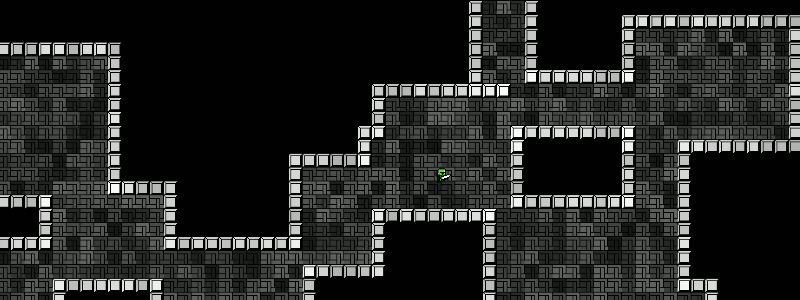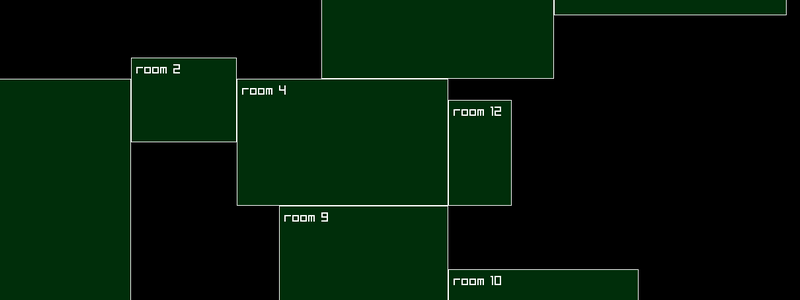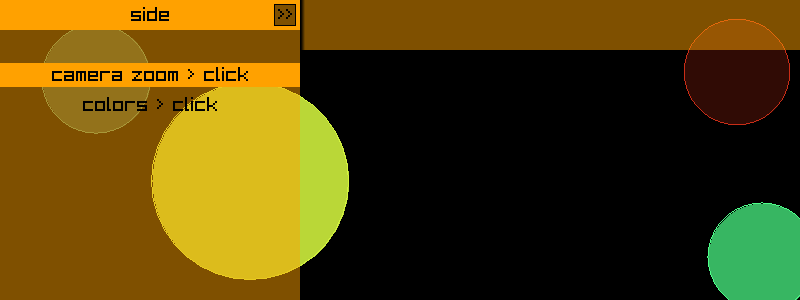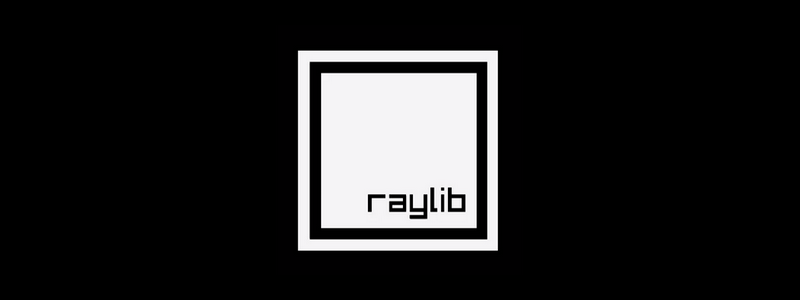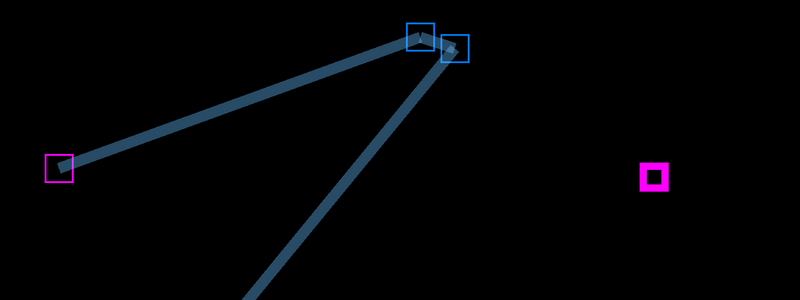Player Bullets > 2D
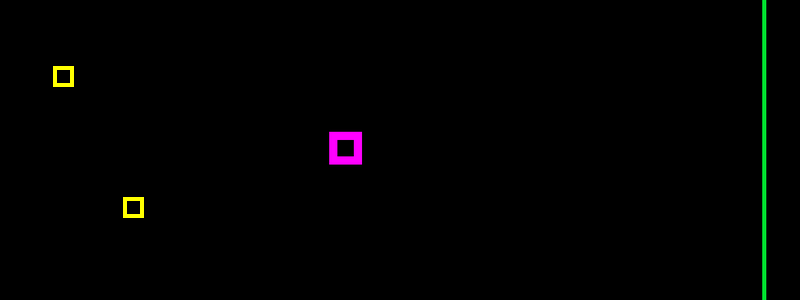
Contents
Create player bullets on mouse click
Demonstrates how to create player bullets that will travel to a point determined by a mouse click on screen. This method works with a camera, using the screen to world position of the mouse click therefore the zoom can be changed. The player can move and the bullets will be destroyed when hitting the border rectangle. This can be used for both player bullets as well as enemy bullets, for enemy bullets the mouse click center point is substituted with the player center. WASD keys move player, left mouse button to shoot and up arrow key to change zoom. View on Github
Before you start
I am a self taught Go programmer and do it as a hobby, the code below is my own interpretation of how to do something, probably not the only way or the best way. This is intended as a resource to learn some basic Raylib and Go game dev skills. If you want to use any of the code anywhere else, feel free to do so.
Code
package main
import (
"math"
rl "github.com/gen2brain/raylib-go/raylib"
)
/* MORE RAYLIB GO EXAMPLES ARE AVAILABLE HERE:
https://github.com/unklnik/raylib-go-more-examples
*/
var (
bullets []xbullet //SLICE OF BULLET STRUCTS
shootTarget, cursorCam, cursor rl.Vector2 //TARGET, CURSOR CAMERA VS SCREEN POSITION, CURSOR
playerRec rl.Rectangle //PLAYER RECTANGLE
spd = float32(10) //MAX SPEED
attackT int32 //PAUSE BETWEEN BULLETS
fps = int32(60) //FRAMES PER SECOND
camera rl.Camera2D //CAMERA
borderRec rl.Rectangle //BOUNCING & BORDER RECTANGLES
cntr rl.Vector2 //CENTER OF SCREEN
scrW, scrH int
)
// STRUCT OF BULLET CONTAINING REC, DIRECTION X & Y, OFF BOOL
type xbullet struct {
rec rl.Rectangle
dirX, dirY float32
off bool
}
func main() {
rl.InitWindow(0, 0, "player bullets - raylib go - https://github.com/unklnik/raylib-go-more-examples")
scrW, scrH = rl.GetScreenWidth(), rl.GetScreenHeight() //GET SCREEN SIZES
rl.SetWindowSize(scrW, scrH) //SET WINDOW SIZE
rl.SetWindowState(rl.FlagBorderlessWindowedMode)
//rl.ToggleFullscreen() //UNCOMMENT IF YOU HAVE DISPLAY ISSUES WITH OVERLAPPING WINDOW BARS
rl.HideCursor() //HIDE THE STANDARD MOUSE CURSOR
cntr = rl.NewVector2(float32(scrW/2), float32(scrH/2)) //CALCULATE CENTER
borderRec = rl.NewRectangle(cntr.X-float32(scrW/4), cntr.Y-float32(scrH/4), float32(scrW/2), float32(scrH/2)) //DEFINE BORDER RECTANGLE
siz := float32(32) //PLAYER SIZE
playerRec = rl.NewRectangle(cntr.X-siz/2, cntr.Y-siz/2, siz, siz) //INITIAL PLAYER RECTANGLE
camera.Zoom = 1.5 //SETS CAMERA ZOOM
camera.Target = cntr //SET CAMERA TARGET
camera.Offset.X = float32(scrW / 2) //ADJUST CAMERA FOR ZOOM
camera.Offset.Y = float32(scrH / 2) //ADJUST CAMERA FOR ZOOM
rl.SetTargetFPS(fps) //NUMBER OF FRAMES DRAWN IN A SECOND
for !rl.WindowShouldClose() {
cursor = rl.GetMousePosition() //GET MOUSE POSITION
cursorCam = rl.GetScreenToWorld2D(cursor, camera) //GET MOUSE POSITION IN CAMERA SPACE WITH ZOOM
upBullets() //UPDATE BULLET MOVEMENTS
input() //CAPTURE INPUT
//TIMER
if attackT > 0 { //PAUSE BETWEEN SHOTS TIMER
attackT--
}
rl.BeginDrawing()
rl.ClearBackground(rl.Black)
rl.BeginMode2D(camera)
rl.DrawRectangleLinesEx(borderRec, 4, rl.Green) //DRAWS BORDER REC
rl.DrawRectangleLinesEx(playerRec, 8, rl.Magenta) //DRAW PLAYER REC
//DRAW BULLETS
for i := 0; i < len(bullets); i++ {
rl.DrawRectangleLinesEx(bullets[i].rec, 2, rl.Yellow)
}
//DRAW CIRCLE TARGET INSTEAD OF CURSOR
rl.DrawCircleLines(int32(cursorCam.X), int32(cursorCam.Y), 10, rl.Red)
rl.EndMode2D()
rl.DrawText("W A S D keys move", 10, 10, 20, rl.White)
rl.DrawText("left mouse to shoot", 10, 40, 20, rl.White)
rl.DrawText("up arrow key change zoom", 10, 70, 20, rl.White)
rl.EndDrawing()
}
rl.CloseWindow()
}
func input() {
//INPUT KEYS FOR PLAYER MOVEMENT SEE MOVEPLAYER FUNCTION
if rl.IsKeyDown(rl.KeyW) {
movePlayer(1)
} else if rl.IsKeyDown(rl.KeyS) {
movePlayer(3)
}
if rl.IsKeyDown(rl.KeyD) {
movePlayer(2)
} else if rl.IsKeyDown(rl.KeyA) {
movePlayer(4)
}
//CREATE BULLET IF ATTACK TIMER IS ZERO
if rl.IsMouseButtonPressed(rl.MouseLeftButton) && attackT == 0 {
attackT = fps / 4
shootTarget = cursorCam //POSITION FOR BULLET AIMING
shoot()
}
//CHANGE ZOOM
if rl.IsKeyPressed(rl.KeyUp) {
if camera.Zoom == 2 {
camera.Zoom = 1
} else if camera.Zoom == 1.5 {
camera.Zoom = 2
} else if camera.Zoom == 1 {
camera.Zoom = 1.5
}
camera.Target = cntr
camera.Offset.X = float32(scrW / 2)
camera.Offset.Y = float32(scrH / 2)
}
}
// CREATE BULLET FUNCTION
func shoot() {
zbullet := xbullet{}
zbullet.rec = playerRec //DUPLICATE PLAYER RECTANGLE FOR BULLET
//MAKE DUPLICATE RECTANGLE SMALLER
zbullet.rec.X += playerRec.Width / 2
zbullet.rec.Y += playerRec.Height / 2
zbullet.rec.Width = zbullet.rec.Width / 2
zbullet.rec.Height = zbullet.rec.Height / 2
//CALCULATE X & Y SPEED TO MOVE TO SHOOT TARGET
playerCntr := rl.NewVector2(playerRec.X+playerRec.Width/2, playerRec.Y+playerRec.Height/2)
diffX := absdiff(playerCntr.X, shootTarget.X) //GET ABSOLUTE X DISTANCE FUNCTION BELOW
diffY := absdiff(playerCntr.Y, shootTarget.Y) //GET ABSOLUTE Y DISTANCE FUNCTION BELOW
if diffX > diffY {
zbullet.dirX = spd //IF DIFFERENCE X IS LARGER X IS FULL SPEED
zbullet.dirY = diffY / (diffX / zbullet.dirX) //CALCULATE Y SPEED
} else {
zbullet.dirY = spd //IF DIFFERENCE Y IS LARGER Y IS FULL SPEED
zbullet.dirX = diffX / (diffY / zbullet.dirY) //CALCULATE X SPEED
}
//IF TARGET IS BEHIND PLAYER CHANGE X DIRECTION TO NEGATIVE
if playerCntr.X > shootTarget.X {
zbullet.dirX = -zbullet.dirX
}
//IF TARGET IS ABOVE PLAYER CHANGE Y DIRECTION TO NEGATIVE
if playerCntr.Y > shootTarget.Y {
zbullet.dirY = -zbullet.dirY
}
//ADD BULLET TO SLICE
bullets = append(bullets, zbullet)
}
func upBullets() {
clear := false //TO CLEAR BULLETS IF COLLISIONS
for i := 0; i < len(bullets); i++ {
if !bullets[i].off {
checkRec := bullets[i].rec //DUPLICATE RECTANGLE FOR NEXT COLLISIONS
checkRec.X += bullets[i].dirX //MOVE DUPLICATE TO NEXT POSITION
checkRec.Y += bullets[i].dirY
//VECTOR 2 POINTS OF FOUR CORNERS OF BULLET RECTANGLE
v1 := rl.NewVector2(checkRec.X, checkRec.Y)
v2 := v1
v2.X += bullets[i].rec.Width
v3 := v2
v3.Y += bullets[i].rec.Height
v4 := v3
v4.X -= bullets[i].rec.Width
//CHECK IF VECTOR 2 HAS EXITED BORDER
canmove := true
if !rl.CheckCollisionPointRec(v1, borderRec) || !rl.CheckCollisionPointRec(v2, borderRec) || !rl.CheckCollisionPointRec(v3, borderRec) || !rl.CheckCollisionPointRec(v4, borderRec) {
canmove = false
}
if canmove {
bullets[i].rec = checkRec //IF NO EXITS MOVE BULLET
} else {
bullets[i].off = true //IF EXITED TURN BULLET OFF
clear = true
}
}
}
//IF CLEAR IS ON REMOVE ALL OFF BULLETS FROM SLICE
if clear {
for i := 0; i < len(bullets); i++ {
if bullets[i].off {
bullets = remBullet(bullets, i)
}
}
}
}
func movePlayer(direc int) {
checkRec := playerRec //DUPLICATE PLAYER RECTANGLE
//MOVE DUPLICATE IN THE DIRECTION OF KEYPRESS
switch direc {
case 1: //UP
checkRec.Y -= spd
case 2: //RIGHT
checkRec.X += spd
case 3: //DOWN
checkRec.Y += spd
case 4: //LEFT
checkRec.X -= spd
}
//VECTOR 2 POINTS OF FOUR CORNERS OF PLAYER RECTANGLE
v1 := rl.NewVector2(checkRec.X, checkRec.Y)
v2 := v1
v2.X += playerRec.Width
v3 := v2
v3.Y += playerRec.Height
v4 := v3
v4.X -= playerRec.Width
//CHECK IF VECTOR 2 HAS EXITED BORDER
canmove := true
if !rl.CheckCollisionPointRec(v1, borderRec) || !rl.CheckCollisionPointRec(v2, borderRec) || !rl.CheckCollisionPointRec(v3, borderRec) || !rl.CheckCollisionPointRec(v4, borderRec) {
canmove = false
}
if canmove { //IF NO EXITS MOVE PLAYER
playerRec = checkRec
}
}
// REMOVES BULLET FROM SLICE
func remBullet(slice []xbullet, s int) []xbullet {
return append(slice[:s], slice[s+1:]...)
}
// GET ABSOLUTE DIFFERENCE
func absdiff(num1, num2 float32) float32 {
num := float32(0)
if num1 == num2 {
num = 0
} else {
if num1 <= 0 && num2 <= 0 {
num1 = getabs(num1)
num2 = getabs(num2)
if num1 > num2 {
num = num1 - num2
} else {
num = num2 - num1
}
} else if num1 <= 0 && num2 >= 0 {
num = num2 + getabs(num1)
} else if num2 <= 0 && num1 >= 0 {
num = num1 + getabs(num2)
} else if num2 >= 0 && num1 >= 0 {
if num1 > num2 {
num = num1 - num2
} else {
num = num2 - num1
}
}
}
return num
}
// GET ABSOLUTE VALUE
func getabs(value float32) float32 {
value2 := float64(value)
value = float32(math.Abs(value2))
return value
}
Video
Want to give it a Go?
To start making games with Go and Raylib you will need:
- Go - https://go.dev/
- TDM-GCC - https://jmeubank.github.io/tdm-gcc/
- Git - https://git-scm.com/downloads
- Go Bindings for Raylib - https://github.com/gen2brain/raylib-go
- Visual Studio Code - https://code.visualstudio.com/
You can, of course, use other code editors however VS Code is my own personal preference

